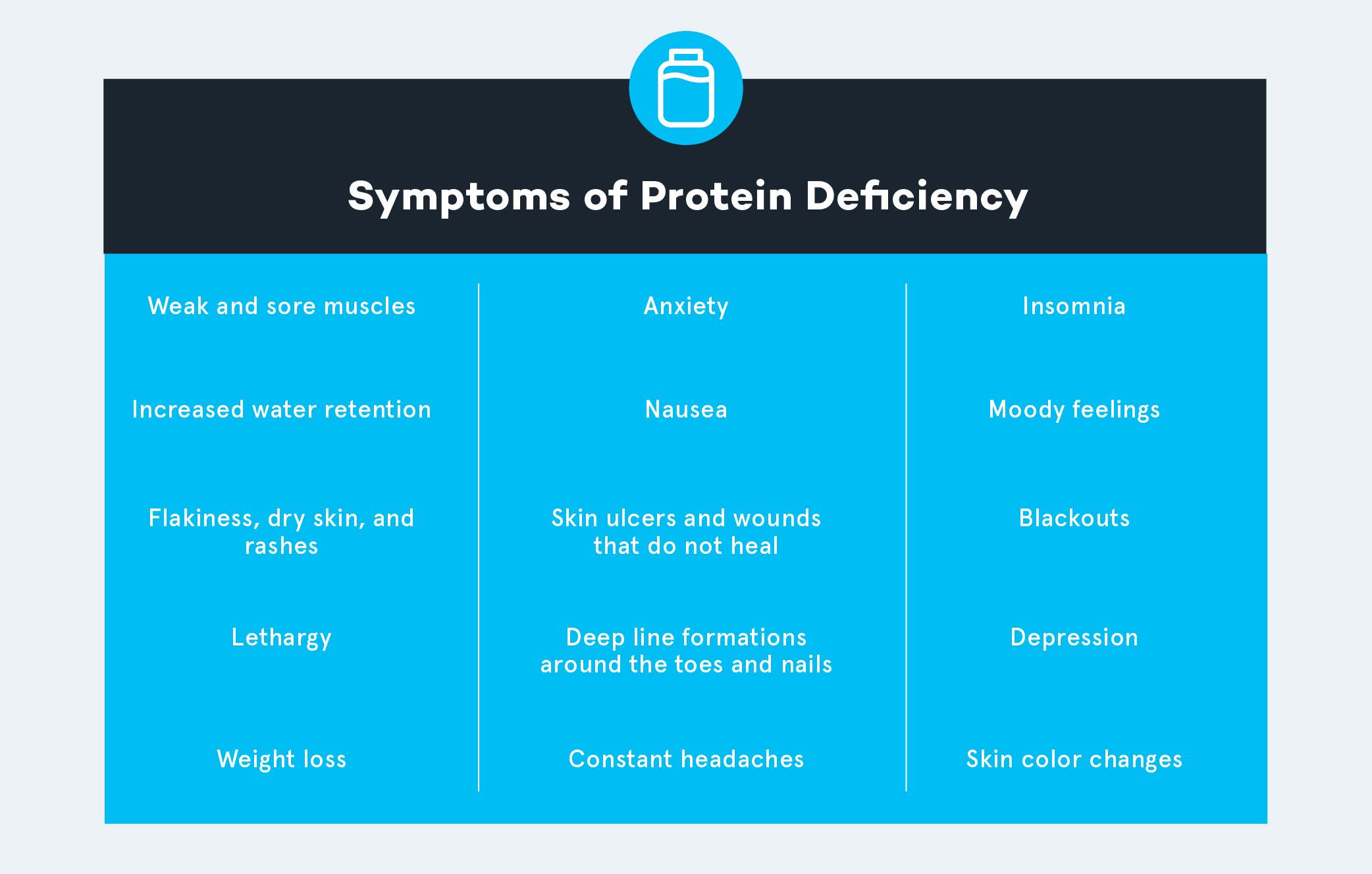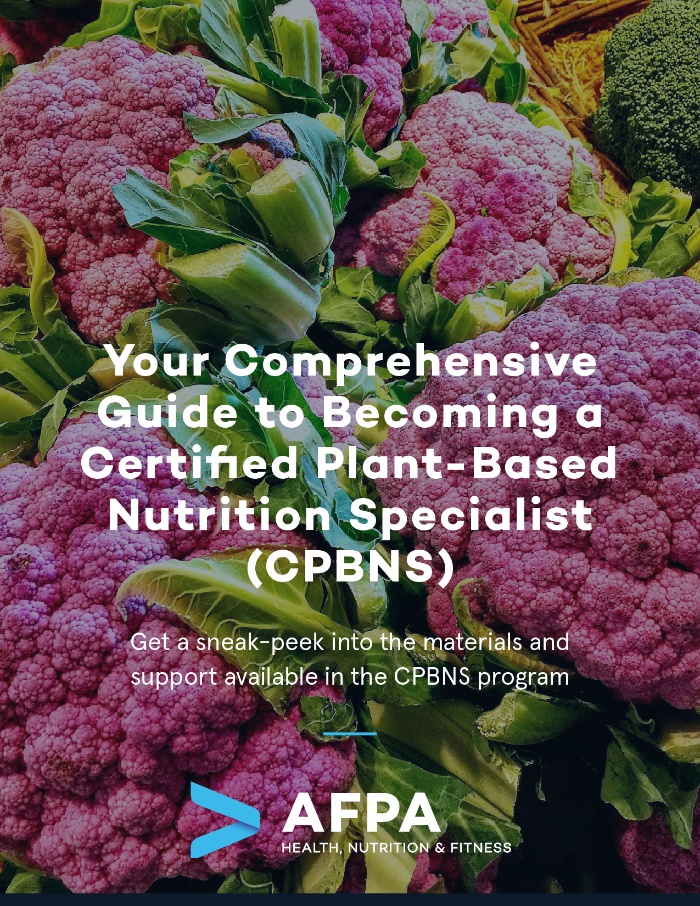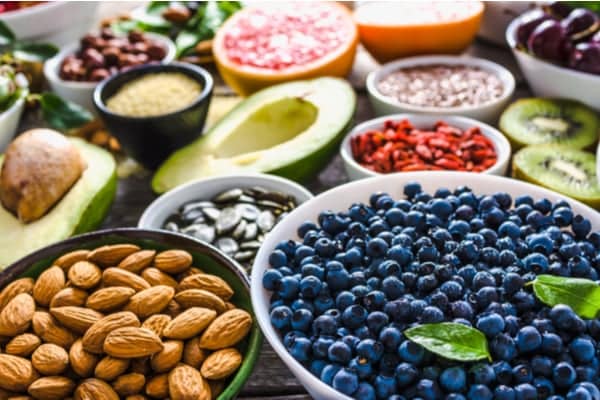In the fitness world, no nutrient is talked about more than protein. Protein is an essential nutrient with an unquestionably important role in the building up of muscles, but that is just the tip of the iceberg when it comes to all the things proteins do in the body.
Proteins are also essential components that make up antibodies, enzymes, and hormones, and they also help transport and store small molecules throughout the body.
As a result, not getting enough protein can be worrisome. While most people who follow balanced, plant-based diets meet their protein requirements, individuals who have higher-than-normal protein requirements or don’t eat a variety of protein-rich plant foods could be at risk of a protein deficiency.
If your client is an athlete or at risk of a protein deficiency, it is essential to be informed about the plant-based protein supplement options out there to help them choose the best option. In this article, we provide you with an overview of plant-based supplement options, the benefits of each, and the potential limitations.
A Note about (the Lack of) Affiliate Links
AFPA does not post affiliate links or endorse any supplement specific brands. In this article, you will find only research-based information about general plant-based protein options. The purpose of this article is to provide you with unbiased, science-backed information about supplements so you can make the best choices for yourself or your clients.
Having said that, different brands may have elements that make them slightly different from the rest. Proprietary blends and the addition of vitamins, minerals, and herbal extracts are all elements meant to add value to the protein supplement, even if it is not the primary purpose of the supplement.
We recommend you always take the time to look at ingredients, manufacturing processes, nutritional information, and certification information for any brands you are considering before purchasing or recommending them. It is also essential that you advise your clients to discuss any supplement regimens with their doctors to ensure supplementation will not interact with medication or conditions they might have.
If you want to learn more about what to consider before taking or recommending a supplement, you can click here.
Reasons People Take Plant-Based Protein Supplements
To really get into the reasons why people choose to take plant-based protein supplements, we must look in detail at two key elements that may motivate people to want to supplement with protein. First, we should consider the reasons why people take protein supplements at all, regardless of the source.
Some of the reasons people choose to supplement their protein intake include:
- Low protein intake
- Higher-than-normal protein requirements, such as those avid athletes might have
- Medical conditions that require a higher protein intake, such as cancer, burns, injuries, or recovery from illness or surgery
- The choice to follow a high-protein diet and needs cannot be met easily with diet
Next is the question behind the choice to take plant-based protein supplements instead of animal-based supplement:
- Ethical motivations
- Health motivations
- Aversion to animal-based foods
- Dislike the taste of animal-based protein supplements
- Desire to benefit from the other phytonutrients some plant-based protein supplements provide in addition to protein
How Much Protein Do We Really Need?
The Recommended Daily Allowance of protein for both men and women is 0.8 grams of protein per kilogram of bodyweight. The Academy of Nutrition and Dietetics recommends that athletes consume between 1.2 and 2.0 grams of protein per kilogram per day. Athletes have a higher protein requirement because of the high circulation volume of blood and the need for protein to repair tissue, among other things.
What does 0.8 grams of protein per kg look like? If your client weighs 60 kg (132 lb), the RDA of protein for her weight is 48 g. If she is not following a plant-based diet, she could drink a glass of skim milk in the morning, have a turkey and swiss sandwich for lunch, and 3 ounces of beef at night and quickly meet her protein requirements.
If she is following a plant-based diet, she can have a cup of soy yogurt in the morning, two and a half cups of rice and beans for lunch, and half a cup of quinoa at night. Together, these foods provide all of the amino acids needed to make up complete proteins.
Neither of the options above includes the small amounts of protein that other foods consumed throughout the day add to the diet, so in most cases, basic protein requirements can be met with a balanced diet.
Keep in mind that newer evidence shows that higher protein intake (up to four or five times the RDA for protein) is associated with healthy outcomes. In fact, some organizations recommend a minimum of 1.2 grams of protein per kilogram, as opposed to 0.8 g, and some researchers have demonstrated that recommended protein intake has been severely underestimated.
Moving forward, you can keep in mind that 0.8 grams per kilogram is the least amount of protein a person should be consuming, and they should increase their protein intake based on their level of physical activity.
What Happens When We Don’t Consume Enough Protein?
When we don’t consume enough protein, we might be diagnosed with a protein deficiency. A protein deficiency is a chronic lack of one or more amino acids in the diet.

Protein deficiencies are not common in adults, but they are possible. Those who are most vulnerable to protein deficiencies are young children, the elderly, and people who suffer from eating disorders.
While protein deficiency in children is uncommon in developed countries, it is common among children in more impoverished populations of developing countries, where dietary diversity is more difficult to come by.
Elderly people experience gradual and natural muscle loss, called sarcopenia. Sarcopenia can be slowed with physical activity and adequate protein intake. However, decreased income, loss of appetite, and changes in the social context of eating can all result in reduced protein consumption among the elderly.
Other elements, like an aversion to protein-rich foods, a poor understanding of or willingness to consume a balanced diet, a lack of access to protein-rich foods, or specific medical conditions, can all lead to protein deficiencies at any age.
What Happens When We Consume Too Much Protein?
One of the worries of researchers and organizations dedicated to kidney health is the overuse of protein supplements, which can lead to the overconsumption of protein.
As with all nutrients, more isn’t always better. While protein building blocks (called amino acids) are necessary for hundreds of bodily functions, from building tissue structure to communication between cells, some researchers have worried about the effects of the overconsumption of protein on the body.
The kidney is the organ that is usually hit hardest from consuming too much protein. This is because the kidneys have an essential role in protein metabolism, as they can reabsorb needed protein for recirculation in the bloodstream. The amount of protein people consume also has an impact on renal function.
That being said, emerging evidence is showing that the supposed negative effects of higher protein consumption have been overestimated. For healthy people with functional kidneys, there is no evidence of protein toxicity, and higher levels of protein consumption are generally associated with health.
While there isn’t an upper limit for recommended protein consumption (meaning there isn’t a specific maximum amount of protein you should consume), the Dietary Reference Intakes (RDI) defined by the Institute of Medicine recommend that protein intake should generally not exceed 35 percent of total energy for protein intake. This is roughly the same amount as 1.5 grams of protein per kilogram per day, which is almost twice the recommended daily allowance (RDA) of protein. For athletes, however, the recommendation may be as high as 2.8 grams per kilogram.

Become a certified expert on plant-based nutrition and help others discover how this way of eating can lead to vibrant health and well-being.
Are Plant-Based Supplements as Complete as Animal-Based Protein Supplements?
This article isn’t meant to compare the nutritional value and effectiveness of plant-based protein supplements with that of animal-based protein supplements. However, there are still many misconceptions about plant-based diets and plant-based products with regards to whether they meet human nutritional needs.
The same question is directed at plant-based protein supplements since protein is generally associated with meat, eggs, and dairy (all animal-based foods). While the belief that you cannot consume enough protein on a plant-based diet has long been disproven, some people question the effectiveness or the completeness of plant-based supplements to meet protein needs.
One of the biggest questions around plant-based diets is whether they provide enough complete protein. Complete proteins are those that contain all of the essential amino acids—the building blocks of protein—which are those that our bodies cannot make. The essential amino acids are:
- Phenylalanine
- Valine
- Threonine
- Tryptophan
- Methionine
- Leucine
- Isoleucine
- Lysine
- Histidine
While all of the essential amino acids are not found in all foods, you can consume different plant-based foods to meet your amino acid needs. For example, methionine from a cashew nut is structurally and functionally the same as methionine from eggs.
Animal-based proteins, like meat, eggs, and dairy, contain all of the essential amino acids in one food.
Some plant-based foods that contain all amino acids in different quantities are quinoa, buckwheat, pea, blue-green algae, and soybeans. These foods do not generally provide as much protein per serving as animal-based proteins, but they do contain high-quality, complete protein. Plant foods, like grains and legumes or nuts and grains, can also be combined to make complete proteins.
Most plant-based protein supplements are made from the foods mentioned above, sometimes combined with other foods. They are processed so that their proteins are isolated and separated from different parts of the plant. This way, they can provide amounts of protein equal to those in animal-based supplements.
Since both animal and plant-based proteins go through isolation processes, supplements can be formulated to provide more or less of different amino acids. For example, pea protein can be processed to provide branched-chain amino acids (BCAAs), just like whey protein can (made from cow’s milk).
Two additional ways in which plant proteins can be made comparable to animal-based proteins are by 1) blending plant-based protein sources to provide an optimal balance of amino acids, and 2) through sprouting and fermentation to break down nutrients that impede the absorption of amino acids and other nutrients.
In can safely be concluded that, in general, plant-based protein supplements are equally effective as animal-based supplements. As many plant-based proteins are minimally processed, they often retain many of the vitamins and minerals that the foods naturally provide.
Note that research shows that the nutrients that tend to be lacking in the blood circulation of plant-based diets are iron and vitamin B12, so it may be useful to examine the diet, as a whole and other supplements your client is taking to consider whether their micronutrient needs are being met.
Comparing 10 Plant-Based Protein Supplements
Peanut-Based Protein
Peanuts and other nuts are among the best-known sources of plant protein. They contain all 20 amino acids in differing amounts, and, when compared to several other common plant foods, they provide among the highest numbers of protein per volume at 13 grams of protein per quarter cup. They contain high amounts of the amino acid arginine, which stimulates the immune system by increasing the production of T-cells by the thymus gland.
Peanuts are low in methionine, which is why peanuts should be complemented with grain to balance its amino acid profile.
You can take advantage of peanut protein by eating peanuts or peanut butter, or you can also find peanut butter powder alone or combined with other plant-sources.
Soy-Based Protein
Soy is among the most popular plant-based sources of protein to use in athlete-focused protein supplements. Soy is high in BCAAs, a group of amino acids that help to support muscle growth. A quarter cup of soy protein isolate powder provides between 20 and 30 grams of protein per serving.
Soy protein has also been demonstrated to have other benefits, including lowering cholesterol and regulating the thyroid. Soy protein has even been used as therapy for controlling menopausal symptoms in postmenopausal women.
Some people avoid soy supplementation due to allergies or fears of increasing the risk of breast cancer.
Algal Proteins
Algal proteins (proteins from algae) are among the newest in the options for plant-based protein supplements. Interest in the use of algae to complement our nutrition has arisen due to increasing awareness around the responsible use of environmental resources and the ecological impact of both animal and plant-based protein sources.
Some species of microalgae are known to have amino acid profiles and protein contents similar to those of eggs, soybeans, meat, and milk. However, some algae species tend to be low in the amino acid cysteine. While research is lacking, there also may be limitations to the absorption of the amino acids in algae, but some extraction methods may help overcome these barriers.
For now, few companies make algae-based protein powders and supplements, and those that do market it to be used as a fortifying ingredient in vegan foods. However, it is likely we will see a growing opportunity to purchase algal proteins in the future.
Pea-Based Protein
Pea protein powders are made from yellow split peas and contain about 21 grams of protein per quarter cup. Pea protein is high in BCAAs (leucine, isoleucine, and valine), making it a popular choice for bodybuilders who follow plant-based diets. In fact, research shows that pea protein is comparable to whey protein in support of muscle building and increasing strength.
Additionally, peas contain components in their cell walls that help to promote digestive health.
Like other pulses, pea protein is low in the amino acid methionine. So, if you are worried about your protein consumption, you can complement pea protein with rice or whole grains, or you can purchase protein blends that include brown rice with the pea protein.
Chia-Based Protein
Chia seeds are best known for their omega-3 content, but they are also a great source of protein. A quarter cup of chia contains about 10 grams of protein.
Best of all, you can make it at home by grinding chia seeds in a food processor or coffee grinder to enhance the absorption of amino acids. It is also possible to purchase isolated forms of chia protein if you prefer to skip the other nutrients chia provides.
Note that chia is low in the essential amino acid lysine, so you may have to complement it with another plant-based source like soybeans, spirulina, or fenugreek seeds, which are all excellent sources of lysine.
Sacha Inchi-Based Protein
Sacha inchi is a seed that is native to South America, and it provides about 17 grams of protein per quarter cup. Like other seeds, it is low in lysine, but it offers an adequate balance of all other essential amino acids. It is comparable to soy protein regarding nutritional benefits for the body.
The seed’s nutritional components may also have a vital role in helping to improve blood flow and lower blood pressure, thanks to the amino acid arginine.
Sacha inchi tends to be quite expensive compared to other plant-based proteins because the seed is still in limited supply.
Hempseed-Based Protein
Hempseed protein is among the most popular plant-based protein supplements in the fitness community because it is easily digestible. It is made by grinding hempseed into a fine powder, and it is sometimes combined with other plant-based foods. It contains all nine essential amino acids but is low in lysine. A quarter cup of hempseed contains 12 g of protein.
In addition to protein, hempseed also provides significant amounts of fiber, which most Americans lack in their diet.
Since heat processing of hempseed can reduce the bioavailability of hemp protein, look for supplements that cold-press the seeds.
Pumpkin Seed-Based Protein
Pumpkin seeds, like most seeds, are best known for their oil composition. However, a quarter cup of pumpkin seeds provides 18 grams of protein! When pumpkin seeds are made into a powder, and some of the oil is removed, they provide an even more robust source of protein. Pumpkin seeds are also good sources of fiber, antioxidants, magnesium, zinc, and other essential minerals.
However, pumpkin seeds are deficient in the amino acids lysine and threonine, so combining them with grains and legumes can help to complement their amino acid profile.
Brown Rice-Based Protein
Some people might be surprised to know that brown rice protein powder is quite high in protein—a quarter cup contains about 22 grams of protein. Brown rice protein powder is a good source of BCAAs, which help to support athletes who want to build muscle mass, and maybe equally as effective as whey protein to do so.
Brown rice protein is low in the essential amino acid lysine, so some formulations blend brown rice protein with other protein sources, like pea protein, to provide a more complete amino acid profile.
Plant-Based Protein Blends
Many brands offer a blend of the plant protein sources mentioned above to provide the right balance of essential amino acids and, potentially, other phytonutrients as well. Some common combinations are rice protein and pea protein or quinoa and hemp protein.
Download our FREE plant-based protein supplement comparison chart
Main Takeaways
Plant-based protein supplements are one way to ensure you are getting enough protein in your plant-based diet. Contrary to popular belief, you can get all the protein you need through a plant-based diet. Just like with traditional protein supplement options, each plant-based source has its benefits and setbacks, and it is crucial to evaluate your options and the nutritional particularities different brands offer you before making a choice.




